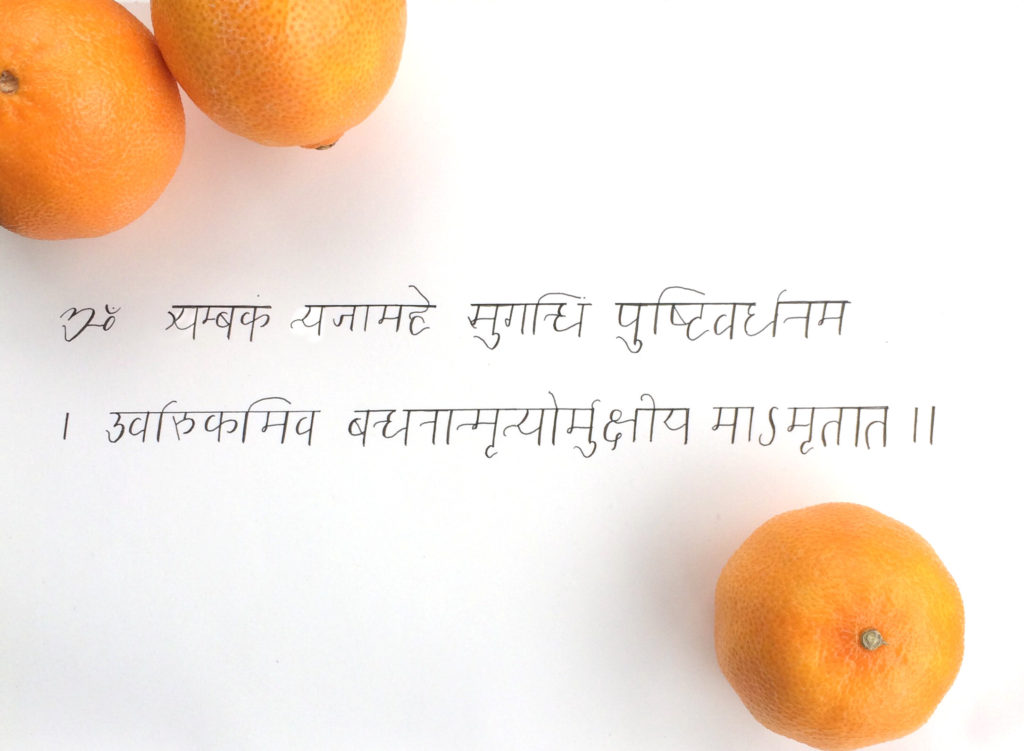
from the Great Liberation Mantra from the Ṛig Veda. “I find it liberating from the of fear of death, the kind of fear that keeps us from living fully” writes Michael Johnson.
by Michael Johnson
पोषण
poṣaṇa ≈ nourish(ment) (n.)
पुष्टि
puṣṭi ≈ well nourished (adj.)
परिहरति { परि- हृ }
pariharati { pari- hṛ } ≈ to nourish (verb)
वक्षण
vakṣaṇa ≈ nourisher (f.)
भृति
bhṛti ≈ food, nourishment (f.)
कृतज्ञा
kṛtajñā ≈ gratitude (f.)
This year, I was able to celebrate Mother’s Day with my mother and father over a nourishing (poṣaṇa) breakfast (bhṛti) at a nice restaurant overlooking the mountains of Asheville, North Carolina. Although Mother’s Day might not be enjoyable for some, I find it to be an excellent opportunity to reflect and appreciate our mothers. Without their nourishment, we could neither thrive, nor exist.
In order to feel deep gratitude for someone, I have found it quite helpful to contemplate their absence first. Had my mother not been able to nourish me with her kindness, compassion, perseverance and patience for all of these years…I would not be here or much worse off. I am inconceivably blessed to have been well-nourished (puṣṭi) by my mother on many levels. Furthermore, I am extraordinarily lucky to have a chance to thank her for this in person. Thank you, Mom!
Unfortunately, my family and I feel the absence of my wife’s mother, Sue, quite profoundly. She was given a grim diagnosis of stage four cancer, but was able to persevere for nearly five years after her diagnosis. I watched Sue exhale her last breath as her daughter held her hand. In a way, we both felt relieved that her suffering came to an end.
Sue passed away about a month before our son Matthew was born. She never got a chance to hold him in her arms and bestow the immeasurable love she wanted to offer him. Though my wife has sustained one of the deepest wounds that I can imagine, she ceaselessly nourishes Matthew with extraordinary love at all times. In a way, Sue’s light and love continues to shine through her, despite the sadness she feels in her mother’s absence.
Though we might imagine that people somehow continue on to unknown realms or dimensions of existence after death, I find the evidence that people depend on a functioning brain and nervous system rather compelling. Our death could possibly be the very liberation (mokṣa) from ceaseless suffering (saṃsāra) that yogis of ancient India strived for (śramana).
Although I cannot know for sure know how long we have left or what happens after death, I do know that our time here is precious. Each moment is an opportunity to appreciate that we have nourishment (poṣaṇa) and by doing so we can further nourish (pariharati) ourselves and the ones we love with our gratitude (kṛtajñā). In honor of all our mothers, here is my translation of the well-known Great Liberation Mantra from the Ṛig Veda:
ॐ
त्र्यम्बकं यजामहे सुगन्धिं पुष्टिवर्धनम् ।
उर्वारुकमिव बन्धनान्मृत्योर्मुक्षीय माऽमृतात् ॥
oṃ
tryambakaṃ yajāmahe
sugandhiṃ puṣhṭi vardhanam
urvā rukamiva bandhanān
mṛtyor mukṣhīya mā’mṛtāt
om
worshipping the three worlds
sweet smelling and well nourished
like a cucumber that falls from the vine
such death is the greatest liberation from death
I first learned this mantra from Śrī Swāmi Saccidāanada in 2001. We sang it 108 times on the full moon, before making a meal, when celebrating birthdays, and when he passed away the following year in 2002. I find it liberating from the of fear of death, the kind of fear that keeps us from living fully. You can find a recording of the original melody and my orginal melody for it here.
May we all be liberated from suffering and appreciate the extraordinary gift of life while it is here.
Michael Johnson ERYT-500 is a lead instructor in the Asheville Yoga Center‘s 200 and 300 hour programs. He is a father, husband, artist, student and co-founder of the musical project Ösel. Learn more about Michael’s work at clearlightyoga.com.
























No Responses to “SANSKRIT: Poṣaṇa ≈ Nourishment”